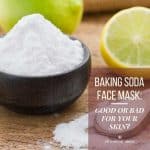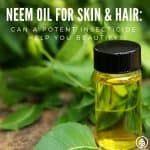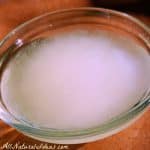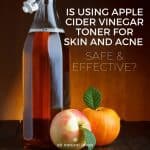Dimethylaminoethanol, known as DMAE, is a natural substance that may contain anti-aging actions for both skin and cognition. But is it safe? And is there research to prove it works?
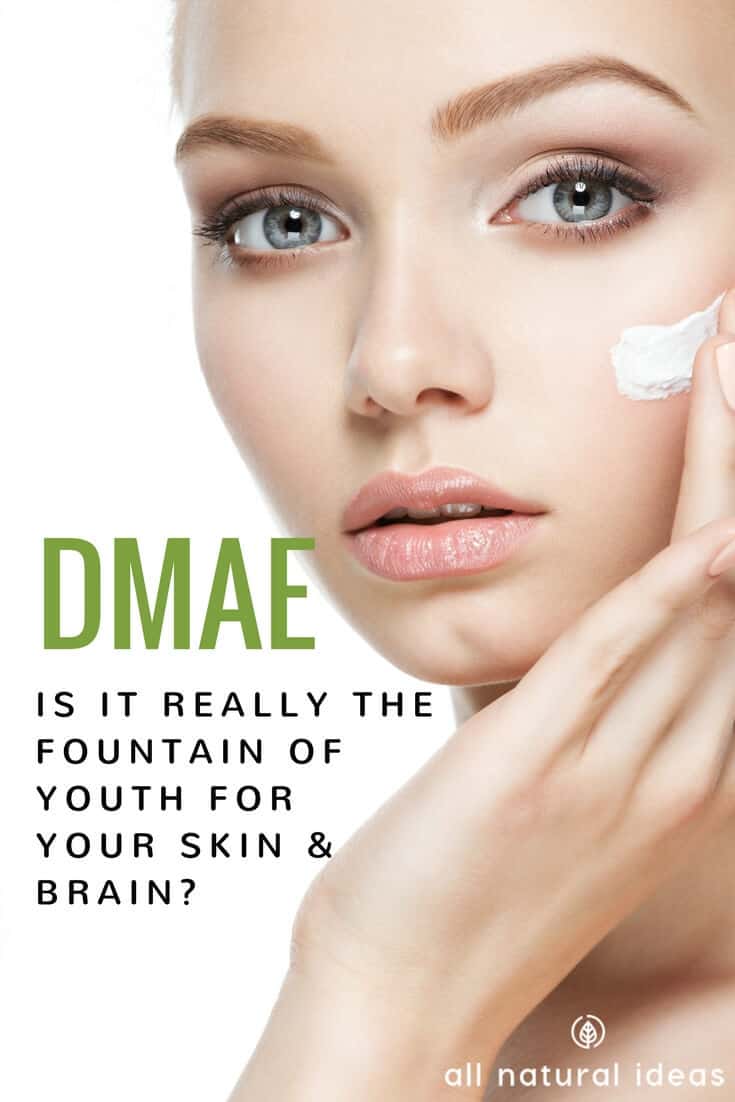
You’ve tried every skin supplement, cream, lotion, mask and treatment under the sun. Hyaluronic acid? Check. Oatmeal mask? Yup. Black seed oil? Been there done that. Almond facial scrub? You betcha.
But have you ever used a skin care remedy with DMAE? It’s an ingredient that’s perhaps more well known for mental acuity rather than beauty. But supplements for skin with it are becoming more popular in natural health circles.
What is this magical substance and does it really work? And what other benefits of are there?
The short answer: there is conflicting opinions about this supplement for skin.
If you do a search on this supplement, you might come across an article on the website of holistic health guru, Dr. Andrew Weil. Dr. Weil does not seem sold on it.
As for benefits of DMAE on skin, Dr. Weil concludes, “I’ve seen no evidence to support claims that (the supplement) in cream form removes age spots from skin.”
However, the article on Dr. Weil’s website is over a decade old. Newer research seems to support using the ingredient for beauty products. Albeit, the research is still limited.
Before reviewing some of the research on DMAE supplements for skin, let’s cover what exactly this ingredient is.
What is DMAE?
The acronym stands for dimethylaminoethanol which is a natural substance. There’s actually a small amount of it in your brain.
Omega-3 fatty acid-rich fish such as sardines and anchovies are relatively rich in DMAE. But don’t worry if you’re considering buying a skincare product with the ingredient.
You’re not going to be rubbing sardine and anchovy on your face. Rather, the ingredient in skin care products are made from fruit.
If you research, “what is dmae,” you’ll find that it’s an organic compound. It’s also a curing agent for resin. Another use is as an additive to paint removers.
But obviously, if you’re looking for a fountain of youth supplement, don’t rub paint remover on your face!
The reason why this supplement has become ubiquitous in skin care products is its low cost. In comparison to other antioxidant ingredients, it doesn’t need to be stabilized.
Because it’s a less expensive ingredient for topical beauty products, it makes it an attractive (excuse the pun) compound to use.
What are the benefits of DMAE?
There is some limited research suggesting it may benefit the brain. In fact, has been suggested to improve the effects of Alzheimer’s. Although as Dr. Weil hints, evidence for this is sketchy.
Actually, this small study doesn’t bode well for benefits of it on brain health. The study includes 27 patients with moderately severe or severe Alzheimer’s disease.
But of the 13 patients in the experimental group, six of them were withdrawn because of side effects, including drowsiness confusion and mild elevation of blood pressure.
Moreover, the researchers conclude in the study that “no significant benefit appear[s] from [DMAE] treatment.”
However, this 2009 study on rats shows it might be effective in reducing memory deficits in patients with cognitive impairment.
There’s even a study that shows DMAE might benefit mood. The researchers of the study conclude that a vitamin-mineral drug combination containing it induces a psychophysiological state of wellbeing.
This conclusion is corroborated by both mood analysis and electrical pattern of brain activity. The subjects in the study suffer from borderline emotional disturbance.
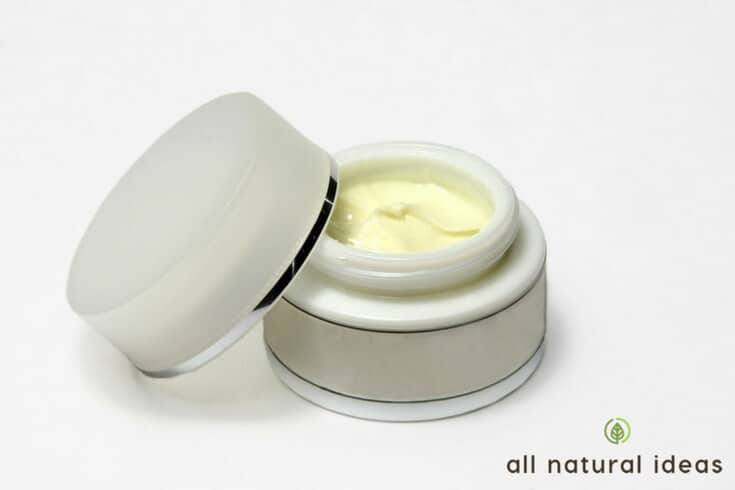
Research on DMAE for skin
But what do studies conclude about it for beauty? Is there enough evidence to support it?
There’s clearly enough anecdotal evidence such as testimonials on product pages and health websites.
However, as for the research, there is some support for DMAE.
Although, there are no long-term studies that provide unequivocal proof that it’s both safe and effective for its anti-aging effects on skin.
Nonetheless, let’s take a look at some of the supporting research.
This analysis of several studies says that rats fed it had less of the formation of a pigment that leads to aging skin (lipofuscin).
Moreover, this supplement flushes this pigment from the body. The researchers also suggest it seems to limit other aging symptoms in brain and heart muscle.
The role of it in dermatology, says the researchers, owes to its potential anti-inflammatory effect.
As for the ability of it to improve skin firmness and facial muscle tone? That could be, the researchers theorize, because of the antioxidant activity.
Moreover, the researchers conclude, the small size of the molecule could be a positive factor to protect cellular targets against free radical damage.”
These conclusions are from 2012. Thus, it would be interesting to read what Dr. Weil’s take on this research would be.
DMAE Side Effects
DMAE has its critics. For one, there’s doubts about there being enough scientific proof that shows it works. This still occurs, despite the evidence above.
Second, there appears to be concern about its safety. Specifically, one study shows that it causes harm to skin cells, at least in experimental rabbits.
Carolyn’s Fitness Facial, a skin care website, says that in the rabbit study, the critter’s cells swelled. Consequently, it appeared to be toxic to the skin cells. In fact, some skin cells died after 24 hours of exposure.
However, the reason that this supplement appears in this study to be harmful might have more to do with its concentration. This at least is Carolyn’s theory.
Although, no doubt, there will be critics of Carolyn’s hypothesis. That’s because she is not a PhD and seems to lack the credentials that would give her any clout to counter the naysayers.
Nonetheless, Carolyn does offer a solid rebuttal. She claims the solution in the study is not pH-balanced.
In fact, the concentration in the study was so high on the alkaline scale that it can indeed cause inflammation of skin cells.
But when this supplement is in skin care products, according to Carolyn, it’s not nearly as concentrated as the rabbit study.
However, it may not be safe if you have a PABA allergy. That’s because PABA, a toxic ingredient in conventional skin care products, is like a chemical cousin to DMAE.
DMAE for Skin
Advertisements featuring the ingredient claim that this organic compound instantly tightens skin. And, it can penetrate easily. Not just into your skin. But your hair as well.
Certain brands also claim that their products with it work better the more often you apply it to your skin.
More benefits of DMAE for your skin, according to advertisements, include soothing skin irritations. And there’s also wound healing and skin hydrating potential.
According to this study, a 3% solution of it as a facial gel is safe and effective for lessening forehead lines. And, in addition, it smooths out fine wrinkles around the eyes.
Moreover, it may appear to provide lip fullness and improves the overall appearance of facial skin.
And yet another study appears to support it for skin.
This one tested the ingredient in different formulations on hairless mice and human skin. Only the experiment groups with DMAE showed skin improvements.
Furthermore, the study shows that it increases collagen fiber thickness. Collagen is the skin’s main structural protein.
The stronger and thicker your collagen, the healthier your skin. Consequently, the researchers concluded they could suggest the ingredient shows hydration effects on skin.


